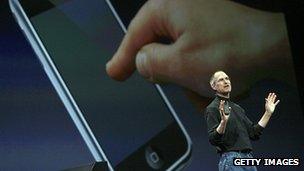Apple faces 'pinch-to-zoom' patent review in US
- Published

Apple's co-founder Steve Jobs had highlighted how the iPhone's innovations were protected by patents
Apple's "pinch-to-zoom" patent should not have been awarded, according to a preliminary ruling by the US Patent and Trademark Office (USPTO).
The innovation was at one of six patents at the heart of a recent lawsuit between the iPhone-maker and Samsung.
For now the patent remains valid, external and Apple is expected to appeal.
However, it could ultimately mean that a judge reduces the amount of damages that Samsung has to pay.
It is the second time in three months that the USPTO has placed one of Apple's patents in the case under review.
In October it was revealed it had taken the same action against Apple's "rubber band" user-interface effect, external which makes lists appear to bounce and snap back in place after a user has scrolled beyond their end.
Rejected claims
News of the latest decision was made public in a filing submitted by Samsung to a California court on Wednesday.
The patent is formally referred to as "application programming interfaces for scrolling operations".
Although it has been commonly referred to as the basis for Apple's "pinch-to-zoom" control mechanism, it specifically describes ways for software to determine whether it should scroll through material or transform it by zooming in or out, or rotating it.
It suggests this could be worked out by seeing if one finger was used or several and examination of the way they were dragged.
A total of 21 specific methodologies are claimed by Apple's filing. All were rejected by the patent office on the basis that they had already been granted to previous applicants - something the USPTO had not discovered before approving the document in November 2010.
Wired's news site, external notes that the majority of patents that are re-examined by the USPTO survive in one form or another.
However, Samsung will likely use the news to press a judge to reduce the $1.05bn (£650m) damages a jury said it should pay last August.
Apple is pressing for the sum to be increased, but the judge has yet to confirm a figure.
- Published18 December 2012
- Published18 December 2012
- Published11 November 2012
- Published23 October 2012